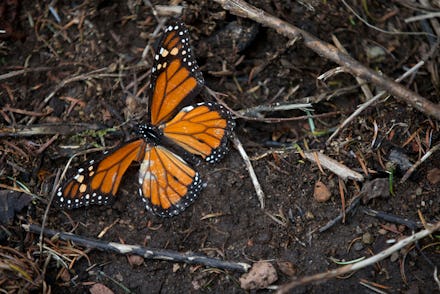Monarch Butterflies Are Disappearing And It's Partially Our Fault

The World Wildlife Foundation has reported that the population of monarch butterflies in Mexico is at its lowest in 20 years. The three major threats to their decline include deforestation, extreme weather conditions and the rise of herbicide-based agriculture destroying milkweed flora, where monarch butterflies lay their eggs, according to biologist Lincoln Brower.
"The forest serves as a blanket and umbrella for the butterflies," Brower said to the Washington Post. Though the area is in the tropics, its elevation of 11,000 above sea level can result in temperatures below minus 10 degrees Celsius. "Butterflies can tolerate that provided they're not wet," Brower said, "but if they get wet, they lose their resistance."
Typically, colonies of monarch butterflies flock to Oyamel fir forests in central Mexico in November to survive winter. "The colonies are spread across 12 mountain ranges in Mexico, and in the biggest year on record they covered 21 hectares," Brower said. "Two years ago, that was down to 2.89 hectares. Last year, it was down to about 1.19 hectares. That's a highly significant trend." Additionally, the WWF reports that this past year, monarch butterflies only occupied 0.67 hectares.
Brower notes that should the monarch butterfly go extinct, it would be no different from the loss of the carrier pigeon, at least from an ecological standpoint. However, Brewer emphasizes that the monarch butterfly is often used as a tool to teach biology to kids, "unequaled by any other insect in the world" due to its unique migration.
With all that said, Brower is cautiously optimistic about monarch butterflies bouncing back, but the conditions have to be just right: from healthy milkweeds, to no drought in Texas or freezing in Mexico. "Monarchs can lay 300 or 400 eggs, and their reproductive capacity is rather extraordinary," Brower said. "Like cockroaches, they've managed to survive eons, through thick and thin, through asteroids and everything."
Read more: Climate Change Is Bad News for Polar Bears, Manhattan, All of Humanity — and Now